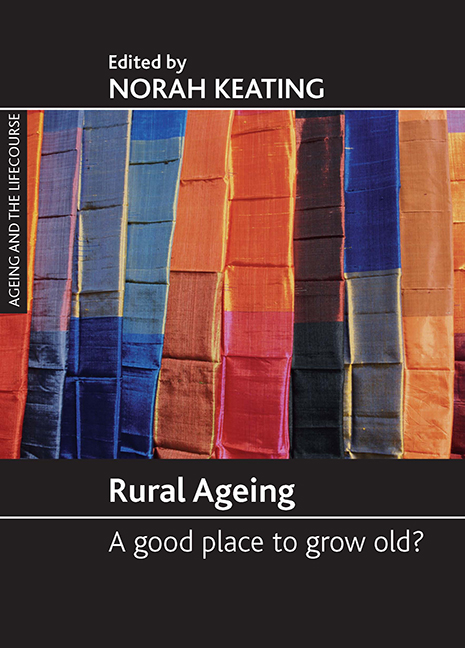Book contents
- Frontmatter
- Contents
- Foreword
- Acknowledgements
- Notes on contributors
- one A critical human ecology perspective on rural ageing
- two Crossing borders: lifecourse, rural ageing and disability
- three Rurality and ageing well: ‘a long time here’
- four The evolution of networks of rural older adults
- five Distance, privacy and independence: rural homecare
- six Respite for rural and remote caregivers
- seven Ageing, disability and participation
- eight Participation in rural contexts: community matters
- nine Staying connected: issues of mobility of older rural adults
- ten Ageing and social exclusion in rural communities
- eleven Age-friendly rural communities
- twelve Revisiting rural ageing
- References
- Index
- Other titles in the Ageing and the Lifecourse series
two - Crossing borders: lifecourse, rural ageing and disability
Published online by Cambridge University Press: 19 January 2022
- Frontmatter
- Contents
- Foreword
- Acknowledgements
- Notes on contributors
- one A critical human ecology perspective on rural ageing
- two Crossing borders: lifecourse, rural ageing and disability
- three Rurality and ageing well: ‘a long time here’
- four The evolution of networks of rural older adults
- five Distance, privacy and independence: rural homecare
- six Respite for rural and remote caregivers
- seven Ageing, disability and participation
- eight Participation in rural contexts: community matters
- nine Staying connected: issues of mobility of older rural adults
- ten Ageing and social exclusion in rural communities
- eleven Age-friendly rural communities
- twelve Revisiting rural ageing
- References
- Index
- Other titles in the Ageing and the Lifecourse series
Summary
Introduction
This chapter introduces lifecourse perspectives that contribute to our understandings of ageing and disability in rural places; highlights what key assumptions about ageing, disability and rural places might fruitfully inform current thinking about the lifecourse; and raises questions for further research. As is evident from the preceding chapter, rural communities are defined in terms of locality and social representation, implying considerable heterogeneity in understanding of community types. When considering experiences of ageing and disability we therefore need to bear in mind how rural communities intersect in their diversity.
Four key lifecourse constructs identified by Giele and Elder (1998) are central to our analysis of future research areas investigating rural ageing and disability across the lifecourse. The first is linked lives, or social integration, the idea that all levels of social action (cultural, institutional, social, psychological, sociobiological) interact and influence each other, not only as parts of a whole but also as the result of contact with other people who share similar experiences. Timing covers the chronologically ordered events of an individual's life that simultaneously combine personal, group and historical markers. The next element, human agency, is embodied in the active pursuit of personal goals and the sense of self. Finally, Giele and Elder suggest that general and unique aspects of individual location affect personal experience and thus can be understood as being socially and individually patterned in ways that carry through time. They refer to this as location in time and space. We regard these four elements as useful framing devices to interrogate existing lifecourse analyses and to frame the research questions specific to ageing and disability in rural places that emerge from this book.
We start the chapter by briefly outlining the literature's progression from a lifecycle to a lifecourse framework. We then identify lifecourse theoretical advances related to ageing and disability in rural places. Drawing insights from multiple literatures, and using the lifecourse elements as our organising framework, we address how questions about ageing and disability in rural places challenge current lifecourse analytic boundaries by interrogating the fine balance among structure and agency; time, place and space; and identity intersectionality. Throughout this chapter, we introduce questions related to how heterogeneous rural contexts (for example, farming, resource extraction, retirement communities and so on) may affect each of the four lifecourse elements.
- Type
- Chapter
- Information
- Rural AgeingA Good Place to Grow Old?, pp. 11 - 20Publisher: Bristol University PressPrint publication year: 2008



